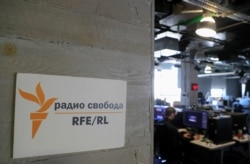The European Union has called on Russia to repeal its controversial "foreign agent" law, which has been used to target a growing number of Russian-language media outlets, including Radio Free Europe/Radio Liberty.
The call, made on May 17 by a spokesman for EU foreign-affairs chief Josep Borrell, comes as Russian authorities both expand their targets of the 9-year-old law, as well their enforcement of it.
Last week, court bailiffs moved to begin seizing property from RFE/RL's Moscow bureau, requesting a list of equipment that potentially could be seized. Bailiffs also obtained a court order freezing the Moscow bank accounts used by RFE/RL.
Days earlier, Russia's media regulator said it was adding VTimes, an online news site founded by ex-staffers of the newspaper Vedomosti, to its "foreign agent" list. The regulator had added another online news site, Meduza, previously.
"The EU has consistently urged the Russian authorities to repeal this stifling legislation and to respect their international obligations on freedom of association, assembly, and expression," Borrell spokesman Peter Spano said.
Russia's so-called "foreign agent" legislation was adopted in 2012 and has been modified repeatedly.
It requires nongovernmental organizations that receive foreign assistance and that the government deems to be engaged in political activity to be registered, to identify themselves as "foreign agents," and to submit to audits.
Later modifications of the law targeted foreign-funded media, including RFE/RL's Russian Service, six other RFE/RL Russian-language news services, and Current Time.
The law, which has been further expanded to include individual reporters, is one of several Kremlin-backed measures aimed at restricting foreign-funded activities in Russia.
A parallel measure known as the "undesirable organizations" law has forced the shutdown of a number of nongovernmental civil society groups in Russia, mainly from Europe and the United States.
"Such actions have the clear intention to hamper RFE/RL's operations in Russia as part of a wider trend to stifle independent media and critical voices in the country," Spano said.
To date, Russian media regulator Roskomnadzor has presented RFE/RL with 520 violations of its labeling restrictions, which are expected to result — once all are adjudicated by Russian courts — in fines of $2.4 million.
All of the appeals of these fines filed so far by RFE/RL have been summarily rejected in Russian courts.
In addition, appeals by three RFE/RL freelancers designated in December 2020 as individual media "foreign agents" have been rejected by courts in northwestern Russia, forcing them to begin filing detailed financial declarations with the authorities and to identify themselves in all electronic communications as a "foreign agent."





